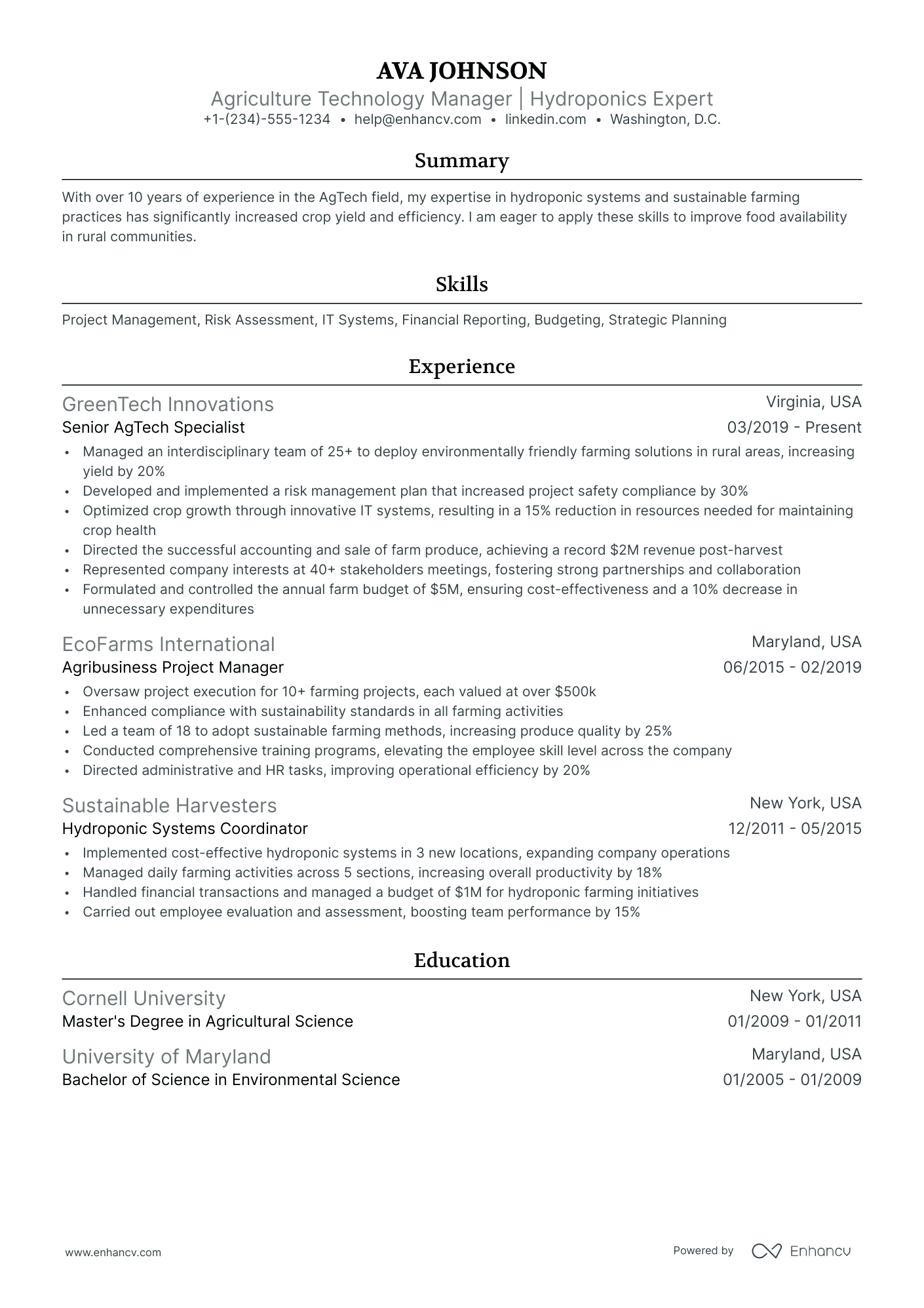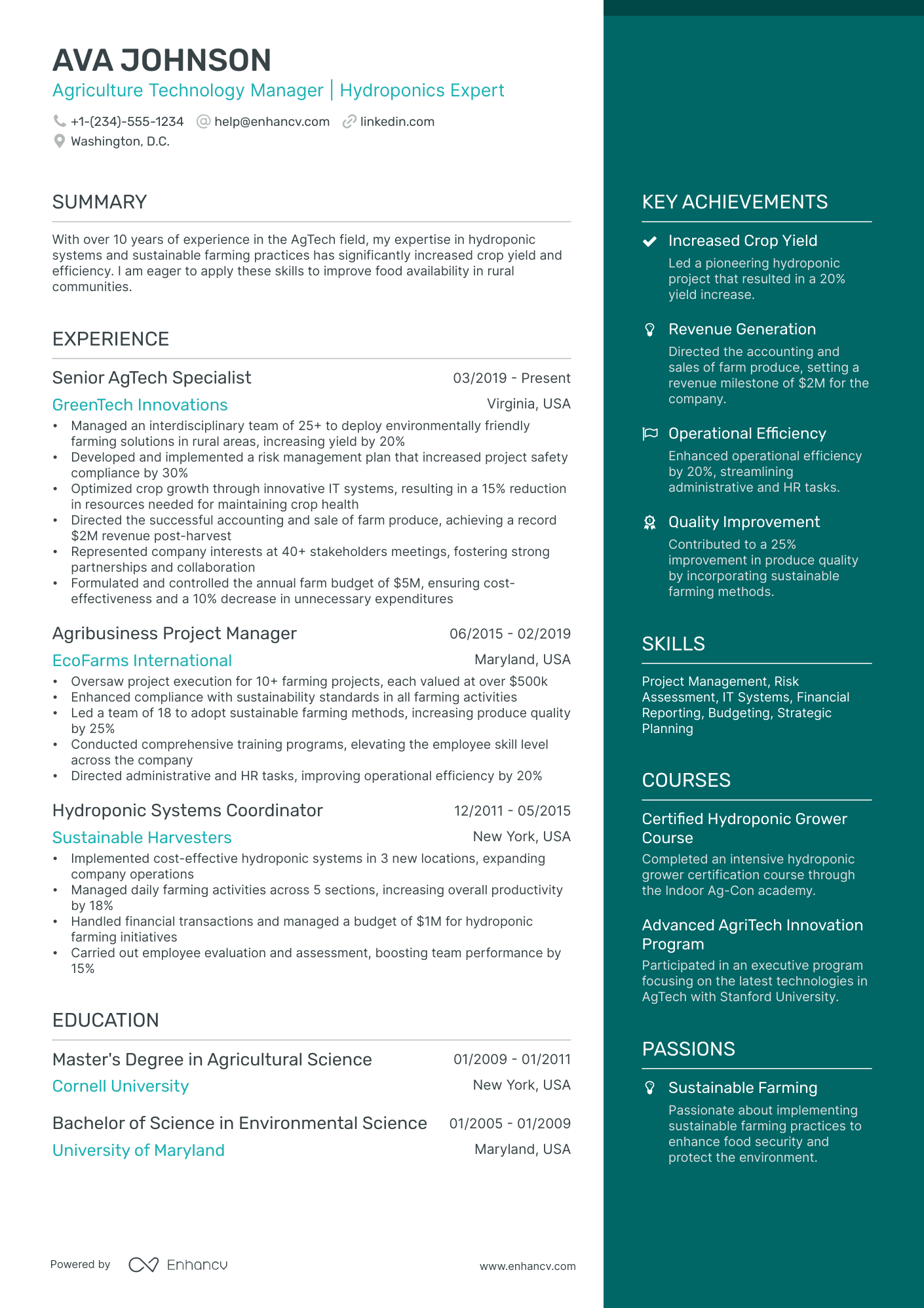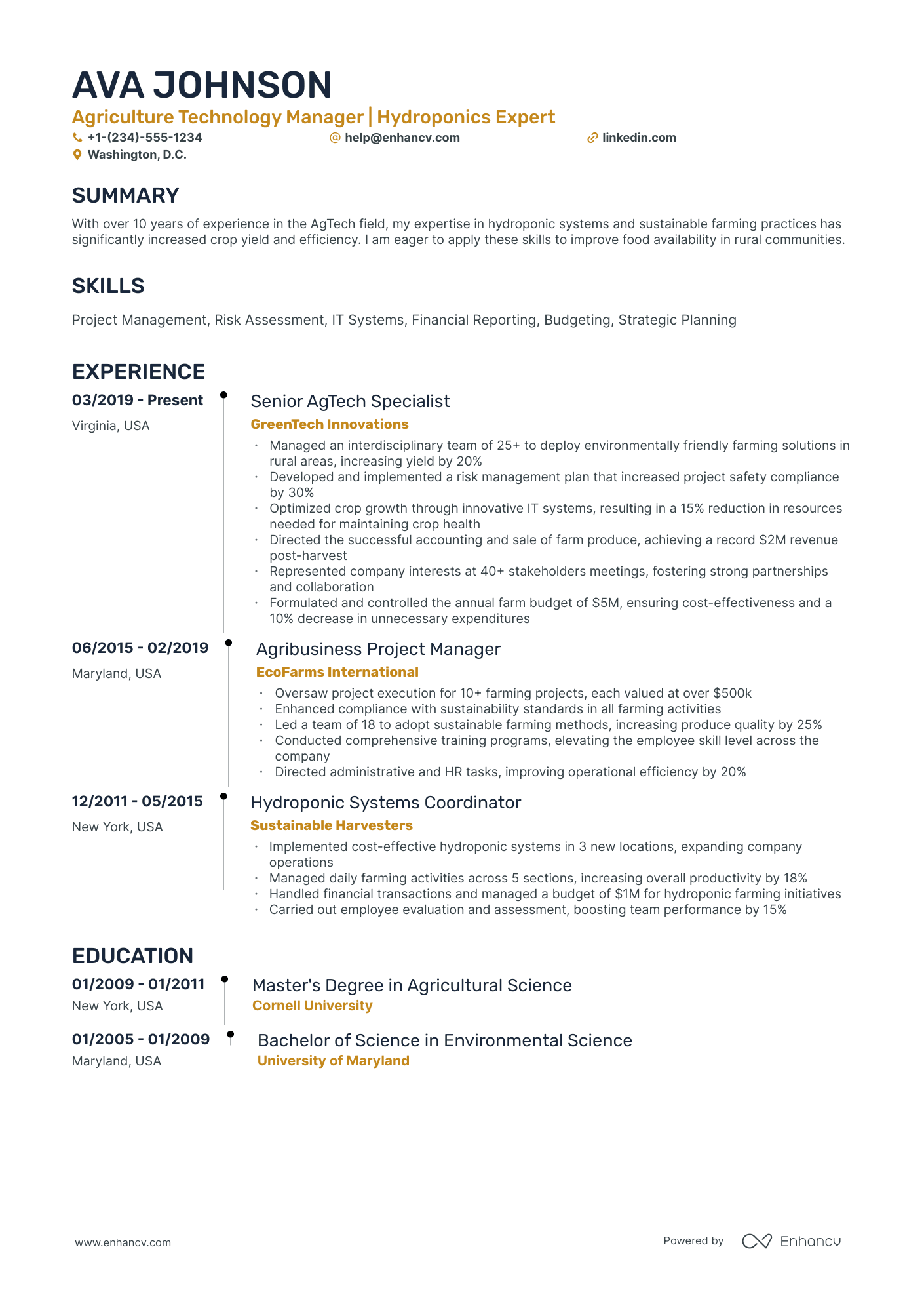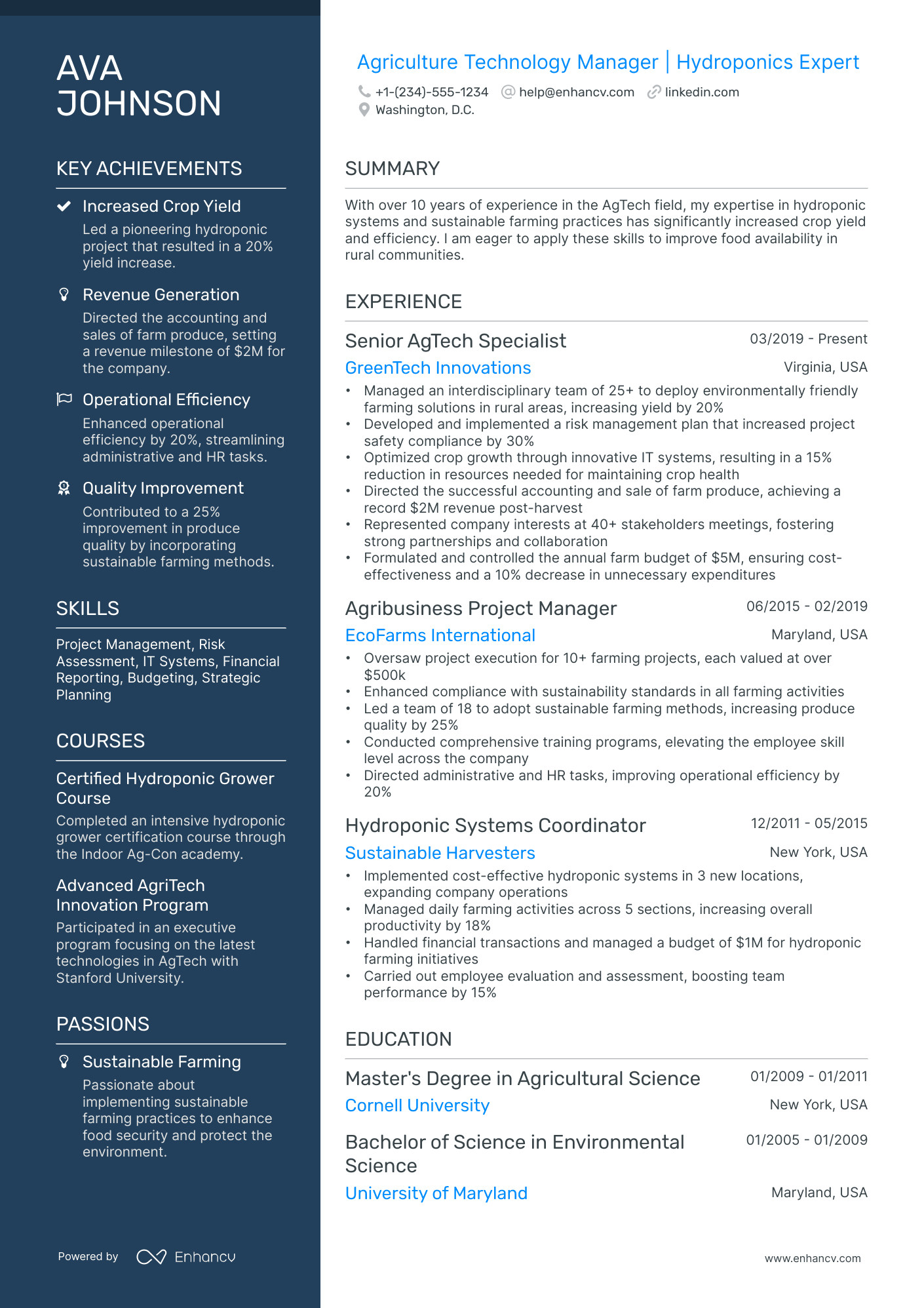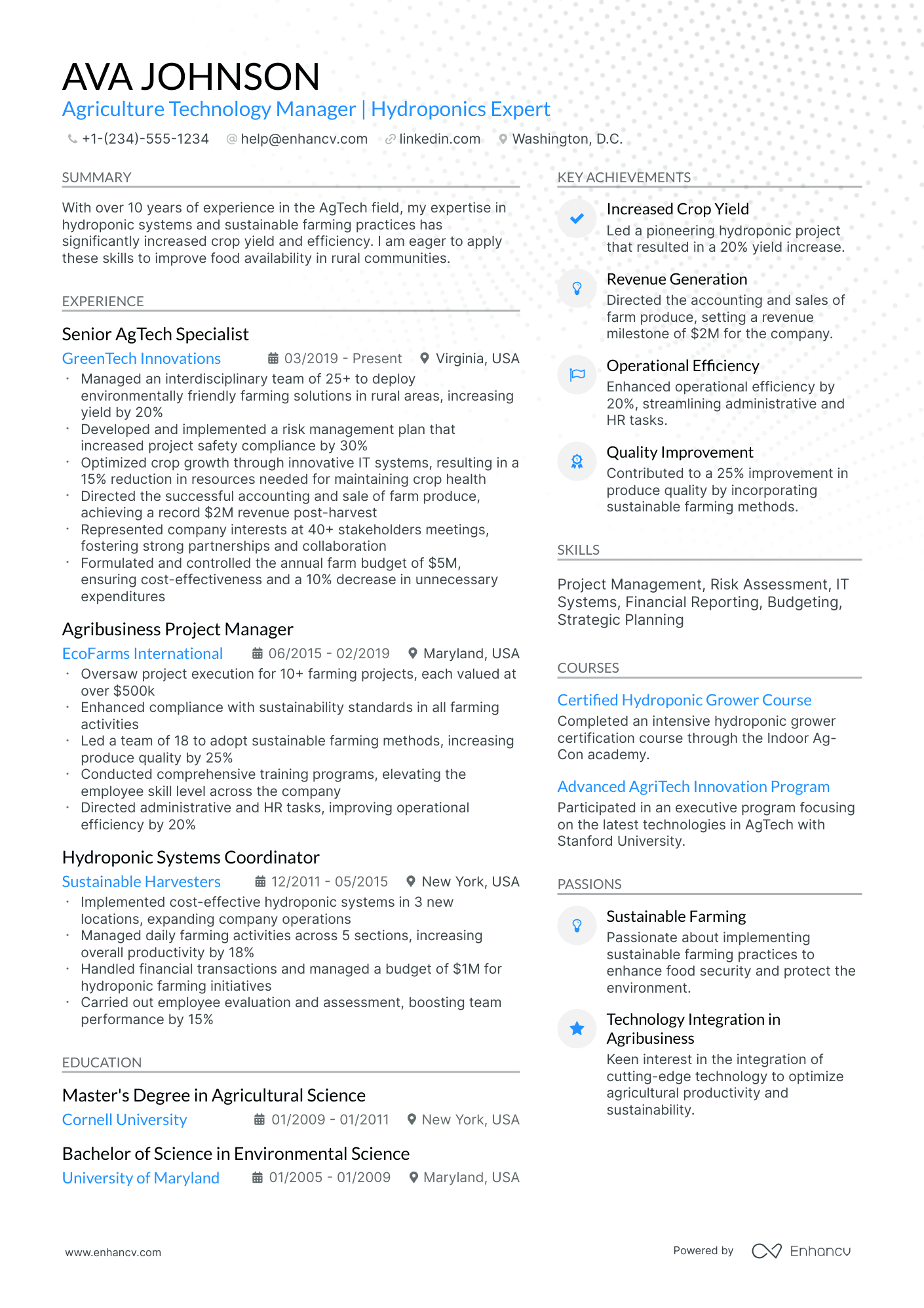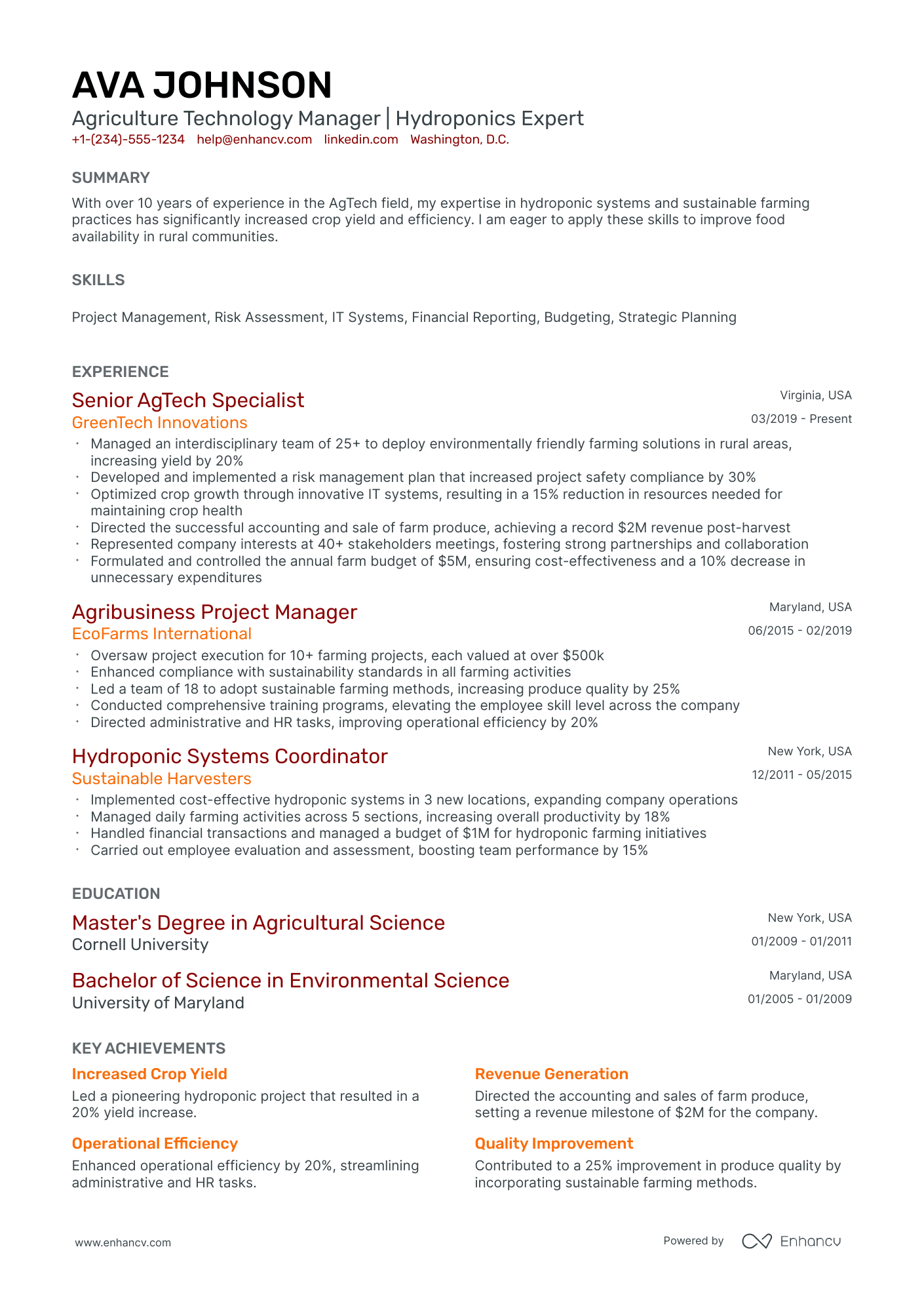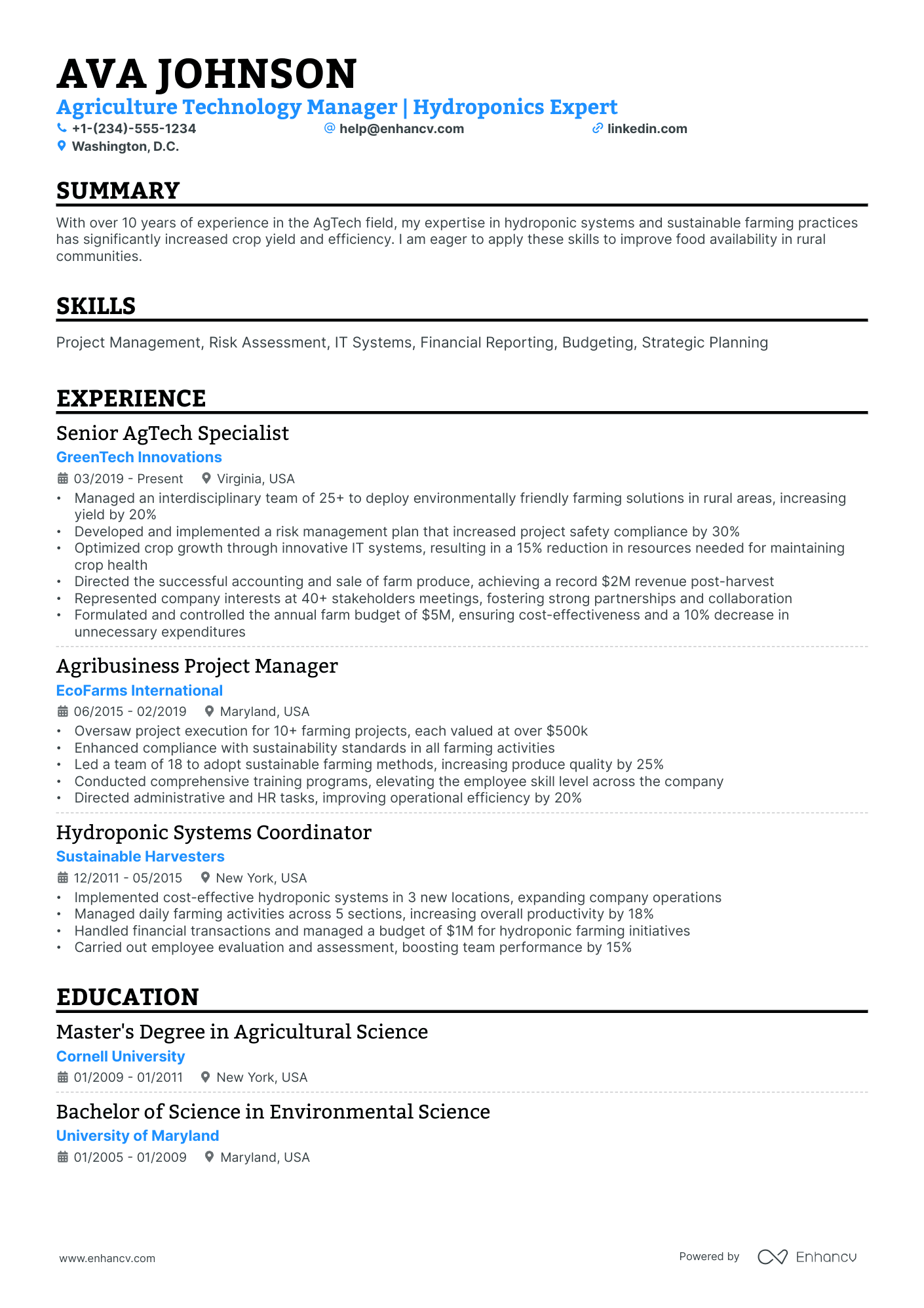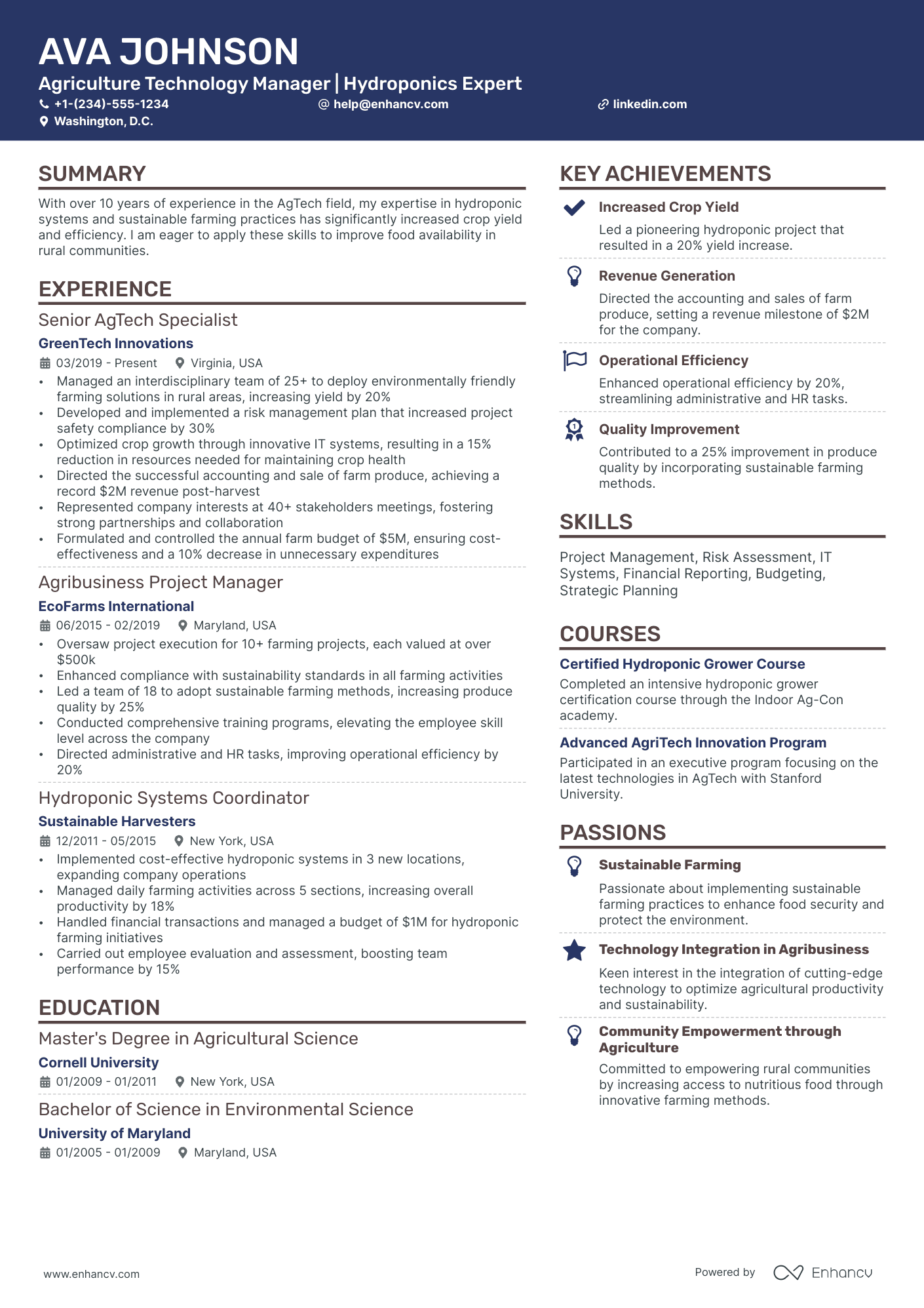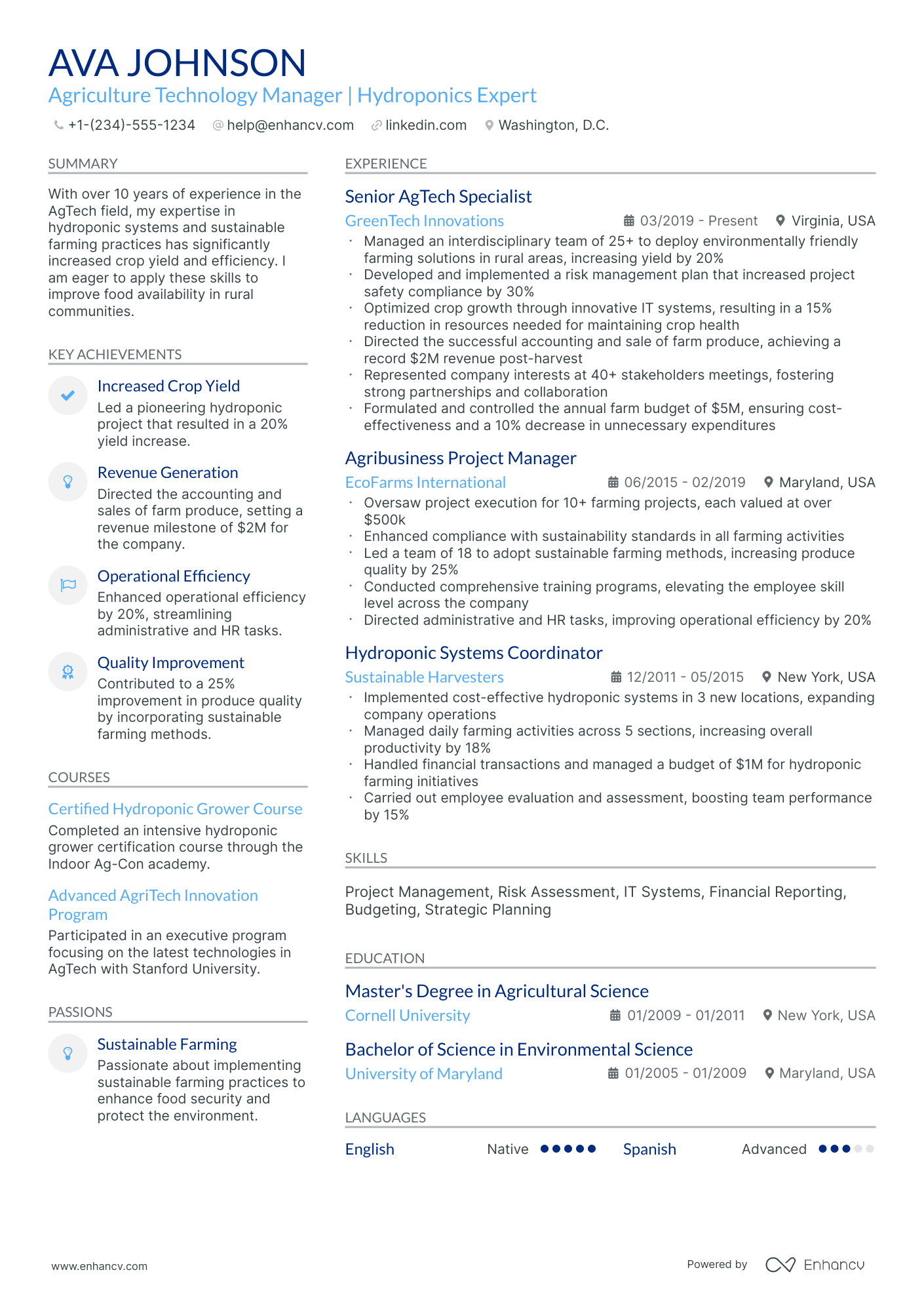Most farm manager resume submissions fail because they read like task logs and bury results under equipment lists and generic duties. That hurts when an ATS (applicant tracking system) filters fast and recruiters scan in seconds.
A strong resume shows what you improved and how you ran the operation. Knowing how to make your resume stand out starts with highlighting yield gains, acres managed, labor costs reduced, safety incident rates, irrigation efficiency, audit pass rates, and on-time harvest delivery. Quantify budgets, headcount, and quality outcomes.
Key takeaways
- Quantify yield gains, cost savings, and crew size in every experience bullet.
- Use reverse-chronological format for seasoned managers and hybrid format for career switchers.
- Tailor each resume to the job posting's equipment, crops, and KPIs.
- Place skills above experience when you're junior, below it when you're senior.
- Anchor your summary to measurable wins, not personality statements or vague descriptors.
- Pair hard skills with proof in your experience bullets so recruiters see context.
- Build and refine your farm manager resume with Enhancv to align content with ATS requirements.
How to format a farm manager resume
Recruiters evaluating farm manager candidates prioritize operational scope, hands-on agricultural expertise, and measurable outcomes like yield improvements, cost reductions, and labor management. A clean, well-structured resume format ensures these signals surface quickly during both human review and applicant tracking system (ATS) screening.
I have significant experience in this role—which format should I use?
Use a reverse-chronological format to showcase your progression through increasingly complex agricultural operations. Do:
- Lead with your most recent role and clearly define the scope of each operation you managed—acreage, headcount, livestock volume, or annual budget.
- Highlight domain-specific expertise such as crop rotation planning, integrated pest management, irrigation systems, USDA compliance, and farm management software like AgriWebb or Granular.
- Quantify outcomes that tie directly to operational performance, including yield per acre, cost-per-unit reductions, revenue growth, or efficiency gains.
I'm junior or switching into this role—what format works best?
A hybrid format works well when you have relevant agricultural skills but limited direct farm management experience. Do:
- Place a dedicated skills section near the top of your resume featuring core competencies like soil health management, equipment operation, livestock care, or agricultural certifications.
- Include project-based experience, internships, or transitional roles—such as assistant farm manager, agricultural technician, or FFA leadership—that demonstrate applied knowledge.
- Connect every action to a clear result, even on a small scale, to show you understand the relationship between decisions and outcomes.
Why not use a functional resume?
A functional format strips away the operational context recruiters need to evaluate your readiness for farm management—removing details about what you managed, where, and at what scale. A functional resume may be acceptable if you're transitioning from a related field (such as agricultural science, landscaping, or supply chain logistics) and have no direct farm management titles, but only if you anchor every listed skill to a specific project, outcome, or hands-on experience.
With your format set, the next step is filling each section with content that highlights your qualifications as a farm manager.
What sections should go on a farm manager resume
Recruiters expect a farm manager resume to clearly show your operational leadership, production results, and compliance track record. Understanding what to put on a resume helps you prioritize the right content for this role.
Use this structure for maximum clarity:
- Header
- Summary
- Experience
- Skills
- Projects
- Education
- Certifications
- Optional sections: Awards, Leadership, Languages
Strong experience bullets should emphasize measurable outcomes, acreage and headcount scope, yield and cost improvements, safety and regulatory compliance results, and on-time delivery performance.
Is your resume good enough?
Drop your resume here or choose a file. PDF & DOCX only. Max 2MB file size.
Once you’ve organized your resume with the right components, the next step is detailing your farm manager experience to show the impact behind each role.
How to write your farm manager resume experience
The work experience section is where you prove you can run agricultural operations—not just describe them. Hiring managers scanning farm manager resumes prioritize demonstrated impact over descriptive task lists, so every bullet should highlight work you shipped or delivered, role-relevant tools or methods you applied, and measurable outcomes tied to production, profitability, or sustainability.
Each entry should include:
- Job title
- Company and location (or remote)
- Dates of employment (month and year)
Three to five concise bullet points showing what you owned, how you executed, and what outcomes you delivered:
- Ownership scope: the operations, crop programs, livestock herds, land parcels, equipment fleets, budgets, or crews you were directly accountable for as a farm manager.
- Execution approach: the agronomic practices, precision agriculture technologies, irrigation systems, pest management frameworks, or financial planning tools you used to make decisions and deliver results.
- Value improved: changes to yield quality, soil health, harvest efficiency, input cost control, regulatory compliance, animal welfare standards, or environmental sustainability tied to your management.
- Collaboration context: how you coordinated with agronomists, veterinarians, equipment vendors, commodity buyers, regulatory agencies, seasonal labor teams, or landowners to achieve shared operational goals.
- Impact delivered: outcomes expressed through production gains, cost reductions, acreage expansion, waste minimization, safety improvements, or market positioning rather than routine activity.
Experience bullet formula
A farm manager experience example
✅ Right example - modern, quantified, specific.
Farm Manager
Red River Produce Farm | Fresno, CA
2021–Present
Two-hundred-acre diversified vegetable operation supplying regional grocers and foodservice accounts.
- Led crop planning and weekly field execution using Agworld and John Deere Operations Center, improving yield per acre by 12% and cutting input waste by 9% across five crop cycles.
- Implemented integrated pest management with drone scouting (DJI) and digital trap logs, reducing pesticide applications by 18% while maintaining Grade A pack-out at 94%.
- Standardized irrigation scheduling with soil-moisture sensors (Irrometer) and ET-based set points, lowering water use by 15% and preventing three heat-stress events during peak season.
- Managed a 22-person seasonal crew with bilingual SOPs, time tracking (ADP), and safety training, reducing recordable incidents by 40% and improving harvest throughput by 17%.
- Partnered with buyers, a food safety auditor, and the packing shed lead to maintain PrimusGFS compliance, passing audits with zero major findings and decreasing customer rejections by 30%.
Now that you've seen how a strong experience section comes together, let's look at how to adjust yours to match a specific farm manager job posting.
How to tailor your farm manager resume experience
Recruiters evaluate farm manager resumes through both human review and applicant tracking systems, so your experience section needs to align directly with the job posting. Tailoring your resume to the job description ensures the specific skills, tools, and responsibilities you highlight match what each employer is actively seeking.
Ways to tailor your farm manager experience:
- Match specific equipment or irrigation systems named in the posting.
- Mirror the exact crop or livestock terminology the employer uses.
- Reflect yield or production KPIs referenced in the job description.
- Include relevant certifications like GAP or organic compliance standards.
- Highlight labor management scope that matches their workforce size.
- Emphasize sustainability or soil health practices when listed as priorities.
- Reference budget oversight or cost reduction aligned with stated goals.
- Incorporate precision agriculture technologies the operation currently uses.
Tailoring means aligning your real accomplishments with each job's stated requirements, not forcing keywords where they don't belong.
Resume tailoring examples for farm manager
| Job description excerpt | Untailored | Tailored |
|---|---|---|
| "Manage daily operations of a 2,000-acre row crop operation, including corn and soybean rotations, with oversight of irrigation scheduling using Valley pivot systems." | Responsible for overseeing farm operations and ensuring things ran smoothly on a daily basis. | Directed daily operations across a 1,800-acre corn and soybean rotation, managing irrigation scheduling and maintenance of Valley center-pivot systems to reduce water usage by 15%. |
| "Supervise a seasonal crew of 15–20 workers, enforce workplace safety protocols, and ensure compliance with OSHA and EPA pesticide application standards." | Managed a team of workers and made sure all safety rules were followed during the season. | Supervised crews of up to 18 seasonal laborers, conducted weekly OSHA safety briefings, and maintained full EPA compliance across all pesticide applications with zero violations over three growing seasons. |
| "Develop and manage annual operating budgets exceeding $1.5M, track input costs for seed, fertilizer, and fuel, and report financial performance to ownership using AgriEdge Excelsior." | Helped with budgeting and tracked expenses for farm supplies throughout the year. | Built and managed a $1.6M annual operating budget, monitored input costs for seed, fertilizer, and fuel, and delivered monthly financial performance reports to ownership through AgriEdge Excelsior, identifying $120K in cost savings over two fiscal years. |
Once you’ve aligned your experience with the role’s priorities, the next step is to quantify your farm manager achievements so employers can see the measurable results of that fit.
How to quantify your farm manager achievements
Quantifying your achievements shows how you improved yield, costs, and risk. Track production volume, input efficiency, labor productivity, quality grades, safety, compliance, and on-time deliveries across fields, herds, equipment, and seasonal cycles.
Quantifying examples for farm manager
| Metric | Example |
|---|---|
| Yield performance | "Increased corn yield from 168 to 186 bushels per acre across 520 acres by tightening soil sampling, variable-rate fertilization, and irrigation scheduling." |
| Cost efficiency | "Cut fertilizer spend 12% ($48,000) by switching to variable-rate application and renegotiating supplier pricing across three farms and two growing seasons." |
| Quality grade | "Raised produce pack-out rate from 82% to 91% by implementing wash-line checks and harvest handling training for a 26-person crew." |
| Safety risk | "Reduced recordable incidents from five to one in twelve months by enforcing equipment lockout procedures and weekly safety tailgates." |
| Delivery reliability | "Improved on-time deliveries from 88% to 97% for 14 weekly wholesale loads by standardizing harvest cutoffs and adding a dispatch checklist." |
Turn your everyday tasks into measurable, recruiter-ready resume bullets in seconds with Enhancv's Bullet Point Generator.
Once you've crafted strong bullet points to showcase your experience, you'll also want to strategically present your hard and soft skills throughout your farm manager resume.
How to list your hard and soft skills on a farm manager resume
Your skills section shows you can run safe, profitable farm operations, and recruiters and an ATS (applicant tracking system) scan this section for job-match keywords; aim for a hard-skill-heavy mix supported by a focused set of leadership and execution soft skills. farm manager roles require a blend of:
- Product strategy and discovery skills.
- Data, analytics, and experimentation skills.
- Delivery, execution, and go-to-market discipline.
- Soft skills.
Your skills section should be:
- Scannable (bullet-style grouping).
- Relevant to the job post.
- Backed by proof in experience bullets.
- Updated with current tools.
Place your skills section:
- Above experience if you're junior or switching careers.
- Below experience if you're mid/senior with strong achievements.
Hard skills
- Crop planning and rotation
- Soil sampling, nutrient management
- Integrated pest management
- Irrigation scheduling and maintenance
- Equipment operation and maintenance
- Preventive maintenance programs
- Farm budgets, cost control
- Inventory, procurement, vendor management
- Food safety, HACCP compliance
- Worker safety, OSHA compliance
- Precision agriculture, GPS guidance
- Farm management software, Excel
Soft skills
- Set daily priorities and targets
- Lead crews through peak seasons
- Give clear task briefings
- Hold vendors accountable to terms
- Make fast calls under pressure
- Resolve conflicts on the floor
- Train and coach new hires
- Coordinate across field and packhouse
- Communicate risks early and clearly
- Enforce safety standards consistently
- Track follow-through on commitments
- Adapt plans to weather changes
How to show your farm manager skills in context
Skills shouldn't live only in a bulleted list on your resume. Explore resume skills examples to see how top candidates integrate abilities throughout their documents.
They should be demonstrated in:
- Your summary (high-level professional identity)
- Your experience (proof through outcomes)
Here's how that looks in practice.
Summary example
Farm manager with 12 years overseeing 2,000+ acre row-crop operations. Skilled in precision agriculture, irrigation scheduling, and crew leadership. Implemented variable-rate seeding that boosted corn yields 18% while cutting input costs through GPS-guided soil mapping.
- Signals senior-level expertise immediately
- Names specific tools and methods
- Leads with a measurable yield outcome
- Highlights team leadership as a soft skill
Experience example
Senior Farm Manager
Heartland Prairie Farms | Champaign, IL
June 2017–Present
- Directed a 15-person crew across 2,400 acres, raising overall harvest efficiency 22% using precision planting technology.
- Partnered with agronomists and equipment vendors to adopt drone-based crop scouting, reducing pesticide spend by $38,000 annually.
- Designed a rotational grazing plan with the livestock team that improved pasture recovery rates by 30% over two seasons.
- Every bullet contains measurable proof.
- Skills appear naturally through real outcomes.
Once you’ve tied your relevant abilities to real tasks and outcomes, the next step is applying that same approach to a farm manager resume when you don’t have formal experience.
How do I write a farm manager resume with no experience
Even without full-time experience, you can demonstrate readiness. Writing a resume without work experience is possible when you focus on transferable projects and measurable contributions:
- Student farm leadership role
- Community garden plot management
- Internship on produce farm
- Livestock care volunteer shifts
- Farmers market operations support
- Equipment maintenance workshop training
- Food safety certification projects
- Yield tracking spreadsheet assignments
Focus on:
- Production results with measured outputs
- Safety, compliance, and documentation
- Equipment, irrigation, and maintenance basics
- Data tracking for yield and costs
Resume format tip for entry-level farm manager
Use a combination resume format to highlight projects, certifications, and farm work exposure before limited paid experience. Do:
- Add a "Projects" section with metrics.
- List farm manager tools you used.
- Include certifications with dates and hours.
- Quantify outputs, costs, or time saved.
- Tailor keywords to each job post.
- Managed a community garden plot using a crop plan, drip irrigation schedule, and yield log, increasing weekly harvest weight by 18% over eight weeks.
Even without direct experience, your educational background can demonstrate relevant agricultural knowledge—here's how to present it effectively.
How to list your education on a farm manager resume
Your education section helps hiring teams confirm you have foundational knowledge in agriculture, business, or related fields. It validates your readiness for farm manager responsibilities.
Include:
- Degree name
- Institution
- Location
- Graduation year
- Relevant coursework (for juniors or entry-level candidates)
- Honors & GPA (if 3.5 or higher)
Skip month and day details—list the graduation year only.
Here's a strong education entry tailored to the farm manager role.
Example education entry
Bachelor of Science in Agricultural Science
Iowa State University, Ames, IA
Graduated 2019
GPA: 3.7/4.0
- Relevant coursework: Crop Production Systems, Soil Science, Farm Business Management, Livestock Operations
- Honors: Magna Cum Laude, Dean's List (six semesters)
How to list your certifications on a farm manager resume
Certifications on a resume show a farm manager's commitment to learning, hands-on tool proficiency, and current industry knowledge. They also signal readiness to meet safety, compliance, and production goals.
Include:
- Certificate name
- Issuing organization
- Year
- Optional: credential ID or URL
- List certifications below education when they're older, less relevant, or mainly support your baseline training as a farm manager.
- List certifications above education when they're recent, role-critical, or required for the farm manager job you're targeting.
Best certifications for your farm manager resume
Certified Crop Adviser (CCA) Certified Professional Agronomist (CPAg) OSHA 30-Hour General Industry ServSafe Food Protection Manager Certification Pesticide Applicator License (State Certification) GlobalG.A.P. Integrated Farm Assurance (IFA) NRCS Conservation Planning Certification
Once you’ve placed your credentials where recruiters can spot them, use your farm manager resume summary to reinforce that value upfront and frame your fit for the role.
How to write your farm manager resume summary
Your resume summary is the first thing a recruiter reads. A strong one instantly signals you're qualified to manage daily farm operations and deliver results.
Keep it to three to four lines, with:
- Your title and total years of hands-on farm management experience.
- The type of operation you've managed, such as row crop, livestock, or mixed agriculture.
- Core skills like irrigation planning, crop rotation, budgeting, or equipment maintenance.
- One or two measurable wins, such as yield increases or cost reductions.
- Practical soft skills shown through real outcomes, like team coordination or vendor negotiation.
PRO TIP
At this level, focus on specific skills, relevant agricultural knowledge, and early contributions that prove your readiness. Highlight tools you've used and results you've helped achieve. Avoid vague statements like "passionate about farming" or "hard worker." Recruiters want proof, not personality pitches.
Example summary for a farm manager
Detail-oriented farm manager with three years overseeing 600-acre row crop operations. Improved seasonal yield by 18% through optimized irrigation scheduling and soil management. Skilled in equipment maintenance, crew supervision, and budget tracking.
Optimize your resume summary and objective for ATS
Drop your resume here or choose a file.
PDF & DOCX only. Max 2MB file size.
Now that your summary captures your qualifications at a glance, make sure your header presents the essential contact and professional details recruiters need to reach you.
What to include in a farm manager resume header
A resume header is the top section with your key contact details, and it boosts visibility, credibility, and recruiter screening for a farm manager.
Essential resume header elements
- Full name
- Tailored job title and headline
- Location
- Phone number
- Professional email
- GitHub link
- Portfolio link
Including a LinkedIn link helps recruiters verify your experience quickly and supports fast screening.
Don't include photos on a farm manager resume unless the role is explicitly front-facing or appearance-dependent.
Use a clear job title, a specific location, and consistent contact details so recruiters can confirm fit in seconds.
Example
Farm manager resume header
Jordan Miller
Farm Manager | Row Crops, Irrigation, and Crew Leadership
Fresno, CA
(559) 214-78XX
jordan.miller@enhancv.com github.com/jordanmiller yourwebsite.com linkedin.com/in/jordanmiller
Once your contact details and role information are clearly presented at the top, add the following additional sections to strengthen your farm manager resume and support the header’s first impression.
Additional sections for farm manager resumes
When your core qualifications match other candidates, well-chosen additional sections can set your farm manager resume apart with role-specific credibility. For example, listing language skills on your resume can be especially valuable when managing bilingual crews or working with international buyers.
- Languages
- Certifications and licenses
- Professional affiliations and memberships
- Publications and research
- Volunteer experience in agriculture
- Awards and recognitions
Once you've rounded out your resume with the right supplementary sections, it's worth pairing it with a cover letter to strengthen your overall application.
Do farm manager resumes need a cover letter
A cover letter isn't required for a farm manager, but it often helps. If you're unsure what a cover letter is and when it adds value, it matters most in competitive searches or when employers expect one. It can make a difference when your resume needs context, or when your fit isn't obvious.
Use a cover letter to add value fast:
- Explain role and team fit: Connect your leadership style to the farm's crew size, shift needs, and operating rhythm.
- Highlight one or two outcomes: Include a project with clear results, like reduced feed waste, improved yields, or fewer equipment breakdowns.
- Show business and user understanding: Reference the farm's crops or livestock, buyers, compliance needs, and how your decisions protect margins and quality.
- Address transitions or non-obvious experience: Translate related work into farm manager responsibilities, and explain any gaps or location changes in one sentence.
Drop your resume here or choose a file.
PDF & DOCX only. Max 2MB file size.
Even if you decide a cover letter adds value to your application, using AI to improve your farm manager resume helps you strengthen the document employers review first and tailor it more efficiently.
Using AI to improve your farm manager resume
AI can sharpen your resume's clarity, structure, and impact. It helps you refine language and highlight results. But overuse strips authenticity. Once your content feels clear and role-aligned, step away from the tool. If you're wondering which AI is best for writing resumes, start with tools that focus on structure and keyword alignment rather than generating content from scratch.
Here are 10 practical prompts to strengthen specific sections of your farm manager resume:
- Strengthen your summary. "Rewrite my farm manager resume summary to highlight leadership experience, crop yield results, and team size in three concise sentences."
- Quantify experience bullets. "Add measurable outcomes—like acreage managed, cost savings, or production increases—to each farm manager experience bullet on my resume."
- Tighten action verbs. "Replace weak or passive verbs in my farm manager experience section with strong, agriculture-specific action verbs."
- Align skills section. "Compare my farm manager skills section against this job description and suggest missing keywords that match my real experience."
- Clarify project descriptions. "Rewrite my farm manager project entries to clearly state the problem, my role, and the outcome in one to two sentences each."
- Improve certification details. "Reformat my farm manager certifications section so each entry includes the credential name, issuing body, and year earned."
- Refine education entries. "Edit my farm manager education section to emphasize relevant coursework, honors, or fieldwork tied to agricultural management."
- Remove redundant phrasing. "Identify and cut filler words or repeated ideas across my entire farm manager resume without losing important details."
- Tailor for ATS. "Adjust my farm manager resume bullets to naturally include keywords from this specific job posting without keyword stuffing."
- Sharpen accomplishment statements. "Rewrite my farm manager accomplishments using a clear result-action-context format with specific numbers where possible."
Stop using AI once your resume sounds accurate, specific, and aligned with real experience. AI should never invent experience or inflate claims—if it didn't happen, it doesn't belong here.
Conclusion
A strong farm manager resume proves impact with measurable outcomes, such as yield gains, cost control, safety results, and equipment uptime. It highlights role-specific skills, including crop planning, livestock care, irrigation, compliance, and crew leadership. Use a clear structure that makes results easy to scan.
Keep your farm manager resume current and focused for today’s hiring market and what’s next. Show steady performance, sound judgment, and practical problem-solving across seasons. When your skills and outcomes align, employers can see you’re ready to lead.
